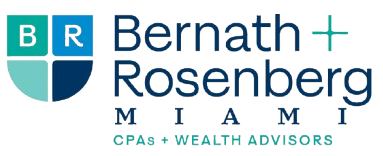By Ted Stricker, CFP®
With the new Administration and GOP-controlled Congress, 2025 is expected to be a year of significant change, especially with tax legislation. If you are a high-net-worth taxpayer or have high income that is subject to higher marginal bracket tax liability, we recommend taking a closer look at your tax planning this year.
Taking advantage of as many possible tax strategies could help bolster your financial situation if changing legislation isn’t as favorable for future years as you anticipate. Here are several of our recommended strategies.
Bunching Deductions Into This Year
In 2018, tax law nearly doubled the standard deduction, so itemizing deductions became less beneficial for many taxpayers. “Bunching” deductions (especially charitable deductions) emerged as a strategy for taxpayers who normally don’t itemize their returns.
To utilize this strategy, a taxpayer alternates between taking the standard deduction one year and itemizing deductions (that aggregately exceed the standard deduction) the following year. This could allow greater tax savings over several years rather than just taking the standard deduction each year, even though the taxpayer has deductions. This technique could especially be effective for taxpayers whose core values include philanthropy each year.
Utilize Strategic Tax Tools Such As Donor-Advised Funds
Donor-advised funds (DAFs) are special investment accounts that are opened by the donor to hold charitable contributions for future giving. The donor receives an immediate tax deduction for the contribution made and the funds are invested to grow for future donations to qualified charitable organizations designated by the donor. We discuss DAF strategies here.
In addition, taxpayers who are 70½ or older or those who are subject to required minimum distributions on IRA and other qualified tax-deferred investment accounts might take advantage of the qualified charitable deduction (QCD) strategy. Distributions from IRAs or qualified accounts (that would normally be taxed at ordinary income rates) that are made as charitable contributions and are sent directly to the charity are tax-free. QCDs may not be made to DAF accounts, however, it is possible to use both strategies separately in a tax year. The maximum allowable QCD amount rises to $108,000 in 2025.
Take Full Advantage of Health Savings Accounts
Every eligible high-income taxpayer should open and fully fund a health savings account (HSAs) each year. HSAs have no income-limit restriction and offer “triple-play” tax advantages; contributions are tax-deductible up to annual limits, growth of the account is tax-free, and distributions for qualified medical expenses are tax-free as well. You’re eligible to contribute to an HSA when you’re covered by an HSA-eligible plan (sometimes called a high-deductible health plan (HDHP)).
Tax-Optimized Retirement Planning
High-income taxpayers should fully contribute to employer-sponsored retirement savings accounts, not only for the income tax deduction, but to get as much of their investment savings into a tax-advantaged account as possible. In addition, for those who will be 60-63 years old in 2025, a special provision allows for up to an extra $11,250 in “catch-up” contributions, instead of the normal $7,500 extra allowed to those 50 years old and older.
If your employer makes matching or profit-sharing contributions to your account, designate those contributions to an after-tax Roth account within the plan. You don’t get a present tax deduction for these contributions anyway and this part of your total account can grow tax-free for retirement.
Include Advanced Strategies Like Roth Conversions for Tax-Free Growth
It’s impossible to know what tax law will look like in the future, but it’s a certainty that tax-free accounts will continue to offer opportunities and planning options to forward-thinking taxpayers. Converting all or part of tax-deferred IRA accounts to a tax-free Roth IRA via the Roth conversion technique could be a smart strategy depending upon your circumstances; pay some tax now and enjoy tax-free growth for the future. Some high-income taxpayers may be able to take advantage of the mega backdoor Roth strategy, where a combination of employee contributions and employer contributions to a Roth 401(k) account can enable a higher-income taxpayer to build up tax-free retirement savings that would otherwise not be available to them (e.g., a normal Roth IRA) due to income limitations on making contributions.
Time Income and Deductions to Minimize Tax Liability
If you anticipate a significant change to your income in 2025 or 2026 and you have the capability to adjust the timing of your income (or deductions), it may be worthwhile to work with your tax advisor to time these to optimize your tax status and minimize tax liability.
Adjustments could include delaying bonuses or significant salary increases, shifting deductible expenses to 2025 and timing significant capital gains to one year or the other, or harvesting tax losses advantageously to offset those gains. Accelerating income into a lower-tax year may also help.
Optimize Business Tax Strategies
If you are self-employed or own a small business, don’t overlook the significant tax advantages of the qualified business income (QBI) deduction. This deduction allows business owners to deduct up to 20% of their “pass-through” business income that is reported on their personal tax return. The deduction is not only available to sole-proprietors and partnerships, but also owners of S-corporations and LLCs.
Small business owners may also receive significant tax breaks to start up retirement savings plans at their business, including a $5,000 maximum annual tax credit for three years for ordinary expenses to set up the plan, tax credits for making employer contributions for eligible employee-participant accounts, and a $500 tax credit for implementing “auto-contribution” features to new or existing plans.
Use Advanced Real Estate Tax Strategies
Most taxpayers know about deducting mortgage interest, but documenting home improvement costs can also save significant tax dollars. Projects such as implementing clean energy structures (solar, wind, geothermal energy, insulation), medically necessary updates to your home, and other improvements may qualify for clean energy tax credits. With the GOP-controlled Congress and promised tax legislation in 2025, these credits may be changed significantly or eliminated after this year.
Utilize the Power of Trusts in Your Tax Planning
Strategic gifting and using specialized trusts, such as grantor retained annuity trusts (GRATs) or charitable remainder trusts (CRTs), as well as combining life insurance and irrevocable trust techniques, are time-tested strategies used by high-net-worth families to preserve wealth for generations, fulfill charitable and legacy intentions, and save significant tax liabilities—both during life and afterward.
We Can Help You Develop a 2025 Tax Strategy
Tax planning is a core service we offer at Bernath + Rosenberg, and we’re here to help!
Our experienced team of Certified Public Accountants and CERTIFIED FINANCIAL PLANNER® professionals stays current with the latest in tax laws and planning strategies to help you pursue a rewarding and comfortable retirement, save on tax liability, and plan for your your family’s future according to your unique and special objectives. By coordinating your tax and financial planning with your long-term goals and values, we assist you in implementing the strategies discussed here (and more!) to benefit your financial future.
To get started and make the most of your hard work, schedule a meeting by calling (212) 221-1140 or email tstricker@brwealth.com.
Traditional IRA account owners have considerations to make before performing a Roth IRA conversion. These primarily include income tax consequences on the converted amount in the year of conversion, withdrawal limitations from a Roth IRA, and income limitations for future contributions to a Roth IRA. In addition, if you are required to take a required minimum distribution (RMD) in the year you convert, you must do so before converting to a Roth IRA. (22-LPL)
About Ted
Ted Stricker is a partner and financial advisor at Bernath + Rosenberg, a full-service accounting, tax, and wealth management firm with offices in Monsey, NY, Lakewood, NJ, Cedarhurst, NY, and Miami Beach, FL. The firm demonstrates a personalized approach to custom-tailored solutions and an unwavering commitment to client service. With over 26 years of experience in the financial services industry, Ted manages the firm’s wealth management team, and specializes in designing financial plans for business owners and affluent families. Since joining the team in 2015, he provides practical and sound advice, combining innovative approaches and strategies that reflect clients’ personality, lifestyle, and goals.
For the ninth year in a row, Bernath + Rosenberg has been named as one of the leading CPA firms in financial planning by Accounting Today, a publication that receives hundreds of submissions each year and features the Top 150 Firms in the nation. Ted is a CERTIFIED FINANCIAL PLANNER® practitioner and is a member of the Financial Planning Association. To learn more about Ted, connect with him on LinkedIn.
Professionals associated with Bernath & Rosenberg P.C. may be either (1) registered representatives with, and securities and advisory services offered through LPL Financial, Member FINRA/SIPC, a registered investment advisor; or (2) solely tax professionals of Bernath & Rosenberg P.C., and not affiliated with LPL Financial. Tax/accounting/CPA-related services offered through Bernath & Rosenberg P.C. is a separate legal entity and not affiliated with LPL Financial. LPL Financial does not offer tax advice or tax/accounting/CPA-related services.
The information contained in this email message is being transmitted to and is intended for the use of only the individual(s) to whom it is addressed. If the reader of this message is not the intended recipient, you are hereby advised that any dissemination, distribution, or copying of this message is strictly prohibited. If you have received this message in error, please immediately delete.

